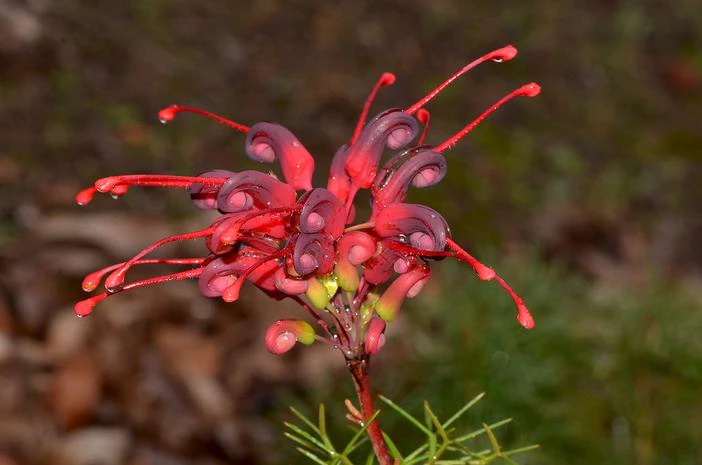Wilson’s Grevillea
(Grevillea wilsonii)
Wilson’s Grevillea (Grevillea wilsonii)
/
/

Jean and Fred Hort
CC BY 2.0
Image By:
Jean and Fred Hort
Recorded By:
Copyright:
CC BY 2.0
Copyright Notice:
Photo by: Jean and Fred Hort | License Type: CC BY 2.0 | License URL: https://creativecommons.org/licenses/by/2.0/ | Uploader: jeans_Photos | Publisher: Flickr















Estimated Native Range
Climate Requirements for Long Branch, New Jersey
| This Plant | Your Site | Plant Suitability for Your Location | ||
|---|---|---|---|---|
| • Precipitation | 7" - 47" | 47" | Aquatic | Aquatic |
| • High Temp. | 76°F - 101°F | 83°F | Your summer temperatures are normal for this plant. | Excellent |
| • Low Temp. | 33°F - 50°F | 24°F | Your winter temperatures may be too cold for this plant | Too cold |
This plant may not grow well at your location - your precipitation is too high.
Summary
Grevillea wilsonii, commonly known as Wilson’s Grevillea or Fire-Wheel, is an evergreen shrub native to the gravelly and sandy soils of open eucalypt woodlands and shrublands in southwestern Western Australia. It typically grows to 1.5 meters (4 ft 11 in) in height and width, with an erect or compact to spreading habit. The plant is renowned for its striking, wheel-shaped, brilliant red flowers that appear from July to December (late winter to early summer) in its native range, which attract nectar-feeding birds and insects. After pollination, the flowers often darken, adding further interest to the shrub’s appearance.
Wilson’s Grevillea is valued for its vibrant flowers and ability to attract wildlife, making it a popular choice for native gardens, informal hedges, and as a feature plant in mixed borders. It thrives in well-drained soils, preferring a sunny to partly shaded position. While it is drought-tolerant once established, regular watering during extended dry periods will keep it looking its best. Propagation is typically from cuttings, and in regions with less ideal conditions, such as the east coast of Australia, grafting onto hardier rootstocks may ensure greater reliability. This species is generally low-maintenance but can be susceptible to root rot in poorly drained soils.CC BY-SA 4.0
Wilson’s Grevillea is valued for its vibrant flowers and ability to attract wildlife, making it a popular choice for native gardens, informal hedges, and as a feature plant in mixed borders. It thrives in well-drained soils, preferring a sunny to partly shaded position. While it is drought-tolerant once established, regular watering during extended dry periods will keep it looking its best. Propagation is typically from cuttings, and in regions with less ideal conditions, such as the east coast of Australia, grafting onto hardier rootstocks may ensure greater reliability. This species is generally low-maintenance but can be susceptible to root rot in poorly drained soils.CC BY-SA 4.0
Plant Description
- Plant Type: Shrub
- Height: 4-5 feet
- Width: 4-5 feet
- Growth Rate: Moderate
- Flower Color: Red
- Flowering Season: Winter, Spring, Summer
- Leaf Retention: Evergreen
Growth Requirements
- Sun: Full Sun, Part Shade
- Water: Low
- Drainage: Medium, Fast
Common Uses
Bank Stabilization, Bee Garden, Bird Garden, Border Plant, Butterfly Garden, Drought Tolerant, Hummingbird Garden, Low Maintenance, Potted Plant
Natural Habitat
Open eucalypt woodlands and shrublands in southwestern Western Australia
Other Names
Common Names: Native Fuchsia
Scientific Names: Grevillea wilsonii, Grevillea lindleyana, Hakea wilsonii
GBIF Accepted Name: Grevillea wilsonii A.Cunn.